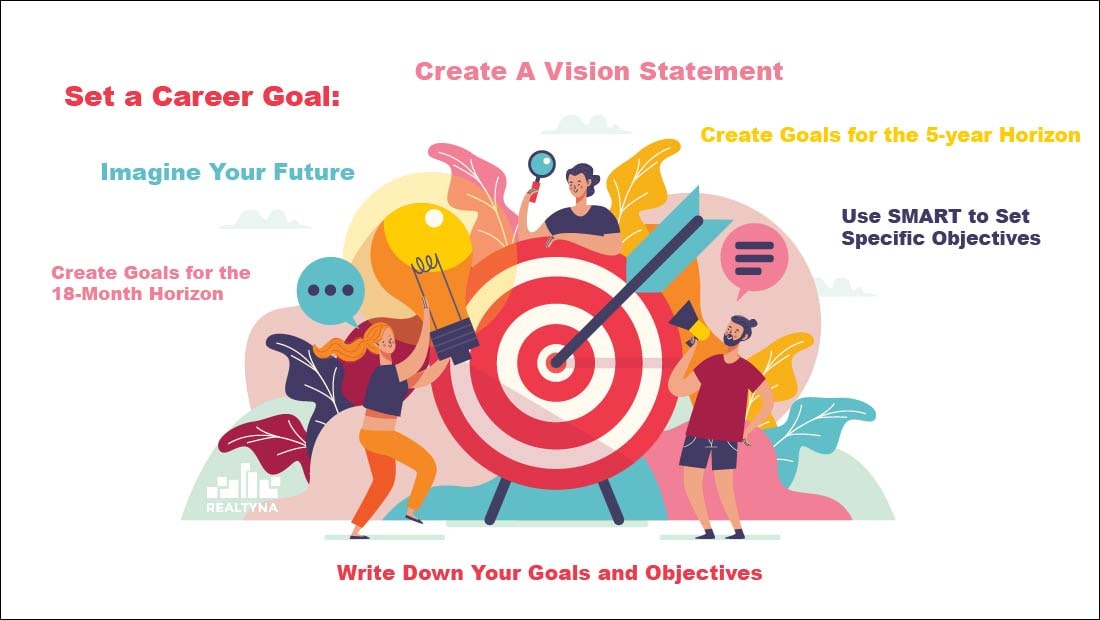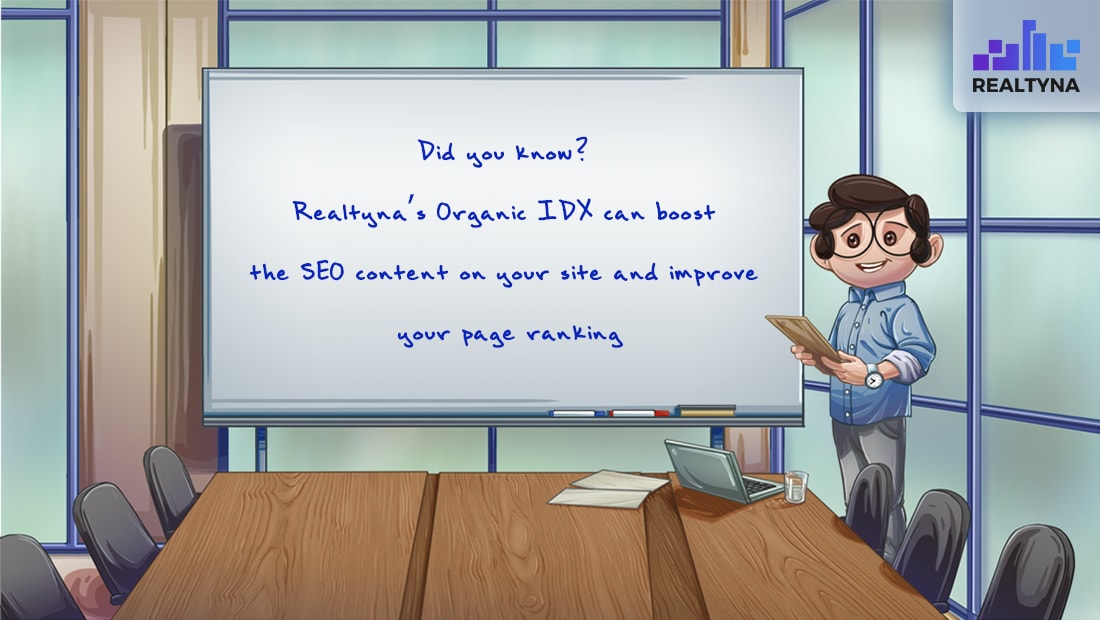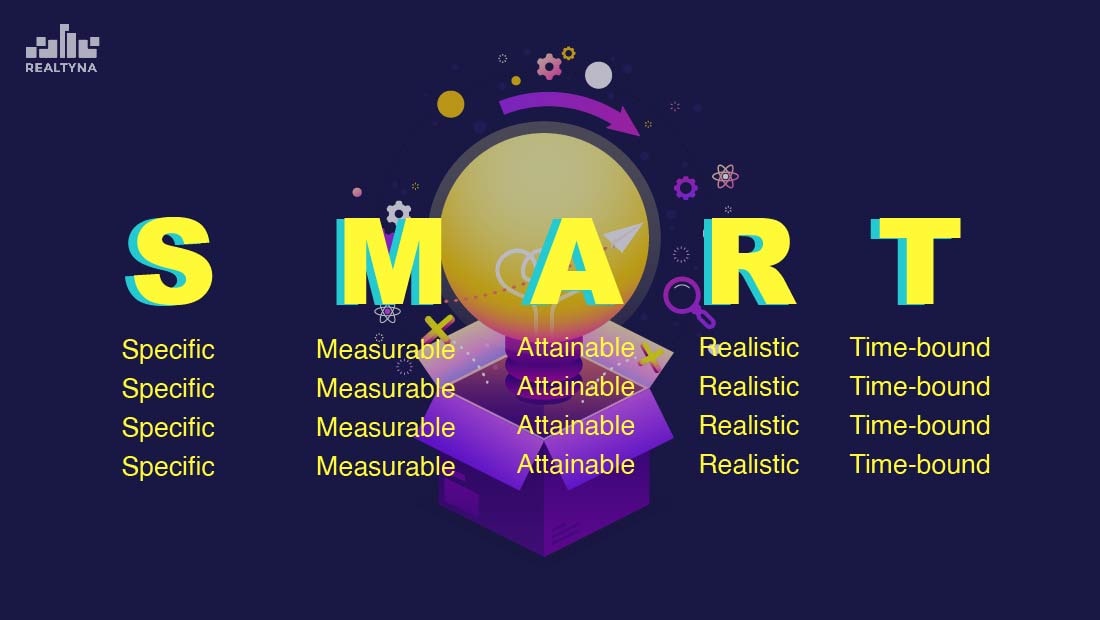
How to Set Career Goals in Real Estate
Setting career goals in real estate takes time and reflection. You need to step back, imagine your future in a way that you can summarize in one to two sentences. Then, you must translate this vision into actionable objectives.
The modern real estate agent is always on the go. On a daily basis, she has homes to show, clients to meet, open houses to host, and paperwork to complete. Not to mention, that the industry is in the middle of a historic shift toward the web, and she now takes on additional web admin and social media duties.
With all these demands, it can be hard to step away to look at the big picture. This is a shame because taking the time to set goals has been shown to increase success in a variety of professional pursuits.
In this article, we’ll cover the 6 steps to create strong career goals as a real estate agent. All you need to do is make the time.
Steps to Set Career Goals as a Real Estate Agent:
1. Imagine Your Future
2. Create A Vision Statement
3. Create Goals for the 5-year Horizon
4. Create Goals for the 18-Month Horizon
5. Use SMART to Set Specific Objectives
6. Write Down Your Goals and Objectives

Imagine Your Future
For many, this initial step is the hardest. Before you set a goal you must be able to visualize yourself succeeding in that goal. If you can’t see it, it won’t seem possible.
So take some time—close your eyes if you have to—and think about yourself in the future. Try to imagine your most successful self. Here are some questions to guide you.
- Visualize a typical workday. Where are you and what are you doing?
- Imagine a conversation with a friend. How do you describe your work to him?
- Think about a work party. What are you and your colleagues celebrating?
- Who are your peers in the industry? Who do you admire?
After 10-20 minutes you should have a pretty good idea of your vision for yourself. Now it is time to put it into words.
Create a Vision Statement
A vision statement is a one to two sentence summary of where you see yourself professionally in the future.
It should include as much as possible from what you imagined in the previous step without over burdening it with details. You want a simple, broad outline that focuses on the “what.” We’ll get to the “how” in later steps.
Some good vision statements are:
“I want to manage the leading real estate group for ranch and land in Cameron County.”
“My career vision is to implement a new sales model that lowers fees for clients and increases volume for the brokerage.”
“My vision is to specialize in condo sales in the Dana Point area until I have enough experience to break into the luxury market. “
LUKE’S TIP:
 Create Goals for the 5-Year Horizon
Create Goals for the 5-Year Horizon
In the next steps you should set out long-term and short-term goals, as well as the objectives necessary to achieve each. Before continuing, however, it may be useful to explain the difference between goals and objectives and how they relate to vision.
A goal is a general plan to achieve a vision. An objective is a specific step that should be completed to reach a goal. Both are necessary.
Consider a travel analogy. You want to drive across the country. This is your vision, a broad outline of what you want to do. But you can’t do it in a single day, so you set out some rest points. You plan to spend the night in Ohio, Iowa, Colorado, and Utah before arriving in California. These are your goals, general descriptions of the steps you need to take to achieve your vision. The objectives are the driving instructions, the specific tasks that need to be completed to reach your goals.
You can also think of vision, goals, and objectives as a pyramid with one vision at the top, a few goals on the next level down and several objectives on the bottom level.
So, now you should create long-term goals for the 5-year horizon. Some good examples are:
“Complete the management training necessary to start a new real estate group.”
“Become the top-selling agent at my brokerage.”
“Implement a social media strategy that results in my listings being the most shared in the area.”
Create Goals for the 18-Month Horizon
Of course, five years is a long way off. Many things could change between now and then. So to make sure you progress down your intended path, you should create short-term goals for the next 18 months.
Some good examples are:
“Complete the requirements to obtain the Accredited Land Consultants designation.”
“Design and launch a new website with improved SEO value.”
Use SMART to Set Specific Objectives
In this phase, you should set out the specific steps necessary to achieve each of your goals. Aim for two to three objectives per goal. While developing your objectives, you should use the SMART construct. SMART is an acronym for specific, measurable, attainable, reasonable, and time-bound.

Specific
You can make your objective specific by including as much detail as possible. Consider the following:
A) Take a course in social media marketing.
B) By July 1st, complete with a 90% passing grade or higher in the Writing for Social Media online course offered on edX.org.
Objective B is better than objective A because it is more specific.
Measurable
A goal is measurable if it can be quantified. This will help you be able to say with certainty if you have achieved it or not.
C) By Aug. 30th, increase my monthly average website lead capture rate by 6 percent by integrating an improved CRM into my lead cultivation procedures.
D) Improve lead capture on my website.
Objective C is better than objective D because it is more measurable.
Attainable
Creating unattainable objectives sets you up for failure. Your objectives should push yourself but not to the brink.
E) Sell properties worth $750,000 in my first three months.
F) By the end of my third month, complete all required shadowing, training, and assisted sales, and communicate my readiness to take my own leads.
Objective F is better because E may be unattainable.
Realistic
You objectives should remain within the realm of possibility.
G) Improve upon last year’s sales, while starting a full time MBA program
H) Within three months, go to coffee with at least five successful agents and listen to their strategies for improving sales year to year.
Objective G is pretty unrealistic.
Time-bound
No objective is met without a deadline, so make sure you include them.
I) By Oct. 30th, complete the necessary pre-licensing courses and receive a passing grade on the New York state real estate exam to earn my real estate license.
J) Get my real estate license this year
Objective I is better its time period is more explicit.
Write Down Your Goals and Objectives
You real estate career goals are now set. All you have to do is write them down. This will allow you to refer to them and check your progress.
The next step is to put together an action plan to achieve your goals and objectives, but we will cover this in a later blog.
For more, check out How to Find a Work Life Balance as a Real Estate Agent and 13 Steps to Build an IDX Real Estate Website with WordPress.


Masscv
Posted at 09:55h, 02 MayThanks for posting this useful tips.